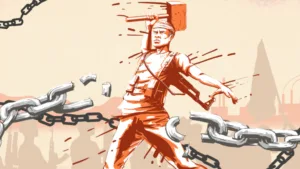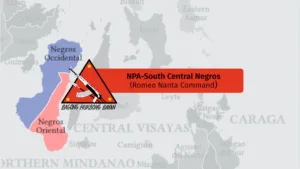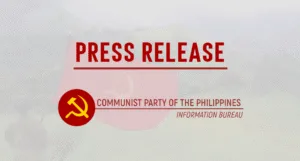By FIDEL V. AGCAOILI
Chairperson, NDFP Human Rights Committee
Like professional serial killers who want to leave no trail to their crime and cause confusion, Gloria M. Arroyo’s hitmen have adjusted their method of execution as they escalate their systematic and nationwide plot to eliminate so-called “enemies of the state.”
By FIDEL V. AGCAOILI
Chairperson, NDFP Human Rights Committee
Like professional serial killers who want to leave no trail to their crime and cause confusion, Gloria M. Arroyo’s hitmen have adjusted their method of execution as they escalate their systematic and nationwide plot to eliminate so-called “enemies of the state.”
They make it appear that the extra-judicial executions they commit are not politically-motivated but are simple cases of robbery with homicide or of “personal grudge.” Next, the reactionary Philippine National Police (PNP) colludes with the death squads and special psychological warfare operatives of the Armed Forces of the Philippines (AFP) by hastily conducting “scene-of-the-crime investigations” of every extra-judicial execution and haphazardly conclude that it is a simple case of homicide thus bringing closure to this mystery.
At dawn of October 8, an Aglipayan priest, Fr. Dionisio Gingging, 53, was killed in his house in Barangay Baiao, Tago, Surigao del Sur by three men who were wearing ski masks. Father Gingging was hacked with bolos, locally called sundang, before he was shot dead. The Caraga regional police director immediately issued a statement saying that “personal grudge” was behind the killing.
Father Gingging’s summary execution happened just five days after former Aglipayan Supreme Bishop Alberto Ramento was brutally stabbed dead inside his rectory in Tarlac City before dawn of October 3. Like the murdered bishop, Father Gingging was a critic of the Arroyo regime and a human rights defender.
The killers of both Aglipayan priests attacked at dawn and used knives or bolos. Bishop Ramento was stabbed twice in the chest while asleep and was stabbed several times more thereafter to make sure he was dead. An independent investigation conducted by lawyers and human rights groups ruled out robbery as the motive in the bishop’s killing and validated earlier denunciations that he was silenced for being an outspoken critic of the government, for being an active peace advocate and for denouncing human rights violations.
Fr. Gingging is the 24th member of the Church killed by Arroyo’s death squads since 2001. Including Bishop Ramento, all had received death threats, had been under intense surveillance and had been listed in the military’s order of battle (OB) before they were shot or stabbed dead. Many of the suspects wore ski masks and rode on motorcycles.
Military and police agents have also been trailing, harassing and sending death threats to at least nine other priests all over the country. All have been active in human rights advocacy and have denounced the reactionary government’s political persecution of its staunch critics and militant people’s organizations.
One of them, Cagayan de Oro Aglipayan Fr. Antonio Ablon, received a text message on Oct. 6, which read: “Fr. Ablon, patay gain ang supreme bishop ikaw pa kaha i sample ka namo dinhi sa CDO (Fr. Ablon, even the supreme bishop was killed; we will make you an example here in Cagayan de Oro).”
By dismissing the extra-judicial killings as criminally-motivated, police probers intend to link the slain Church leaders and other victims of summary killings or enforced disappearances to criminal syndicates, remove from the public mind the victims’ outstanding role in people’s issues and clear the reactionary regime and its death squads of any responsibility.
This dastardly act of the regime only means that it intends to escalate the political killings and other atrocities, despite growing international outrage, while pointing the accusing finger at petty gangs and criminal syndicates.
It should no longer surprise the Philippine media and the people as a whole that the PNP is deeply involved in whitewashing these murders and other brutal attacks on political dissenters and critics who have been tagged as “front organizations” of the communist and “enemies of the state.”
Being deeply involved in counter-insurgency, one of the PNP’s special roles, based on a recent memorandum of agreement with the AFP, is to clear the military of any responsibility to the string of killings that have been committed and pin the blame on the New People’s Army or plain criminals. The memorandum tasks the PNP to immediately seal off scenes of extra-judicial killings or armed encounters and file charges of rebellion against human rights groups or other citizens’ organizations for interfering in “police work.”
In the first place, policemen have also been identified in many of the 757 extra-judicial executions and 184 enforced disappearances that have been perpetrated since 2001.
This AFP-PNP scheme was hatched directly within the war room of Arroyo’s Cabinet Oversight Committee for Internal Security which is pushing to the hilt the US-supported “Oplan Bantay Laya” as an instrument of political persecution and for staying in power. The death squads are actually composite teams of handpicked military and police elements under the supervision of military intelligence groups.
The Arroyo regime is courting a backlash from the people with this latest dirty trick. Like Marcos, the reactionary president of the government of the Republic of the Philippines (GRP) is recruiting more and more people to the armed struggle by closing all peaceful avenues for political expression and for social and economic reform.













